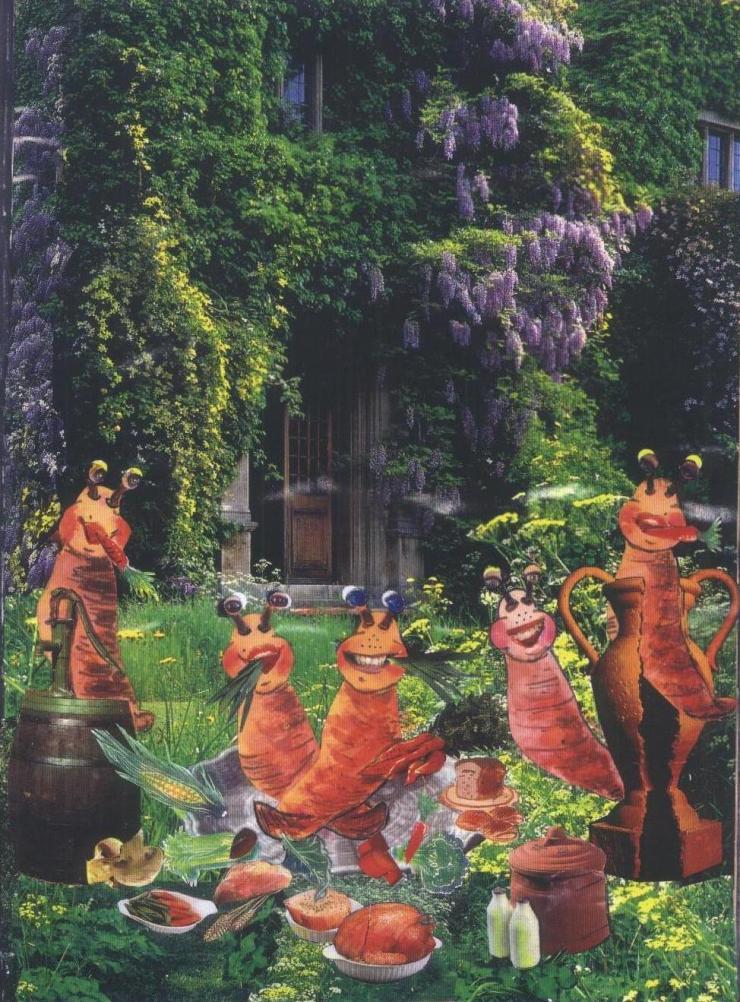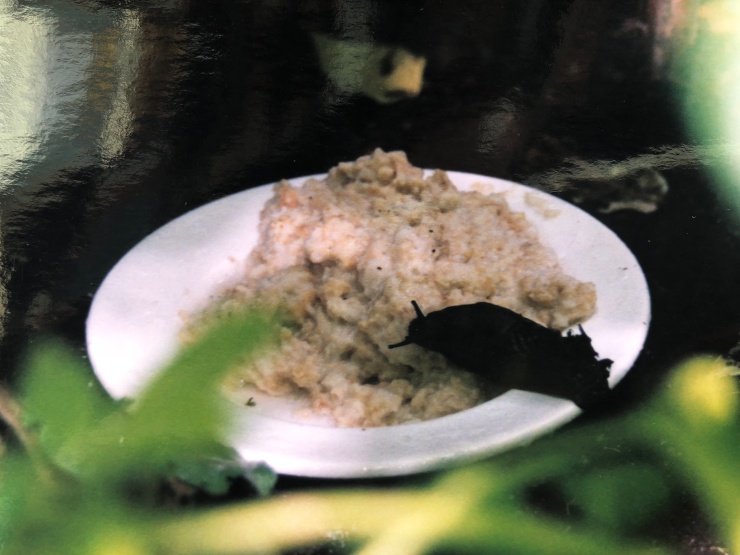
Courtesy of BBC Earth:
I have always considered myself to be one of those people who immediately form relationships with children and animals. Leaving children aside on this occasion, let me say that in my time I have bonded with many animals, as you may gather from my blogs, but I never expected to get deeply involved with slugs, nothing personal, you understand, just a difference of personalities, or so I thought. It proves how wrong one can be as far as first impressions go….
It all began one summer when fed up with some of my plants by the front door being “trimmed” by the resident slugs, I had the illuminating idea to leave by the side of the door a few lettuce leaves, some bits of French stick and even a few slices of cucumber. The next morning I found my plants intact and the dinner offerings demolished. It was my lightbulb moment – all I had to do was to provide the slugs and some snails with my green waste, plus some soft bits of bread and unsalted butter, and hey presto, they would leave my cherished plants alone. What started as a daily ritual become a set-in-stone supper time. I only realised how important my timekeeping was to slugs when one evening I happened to be 20 minutes late. When I finally opened the front door to put down the supper, I was confronted by an orderly queue of slugs and snails across the entire front step. All of the diners were facing the front door, and it was obvious that they knew from where the food would be coming. That was the moment that I realised that the slugs and snails had a clear perception of the world that surrounded them, and it was worthwhile to study their habits.
“Suite from The Victorian Kitchen Garden: I. Prelude” by Paul Reade, performed by Emma Johnson on piano and Skaila Kanga on harp:
Slugs eat with gusto, loudly crushing, chomping and munching the greens in their powerful jaws. The noise was so loud that when I stood in the open doorway, I could hear them dining from three feet away. Their obvious pleasure and enjoyment was not only amusing but it inspired my paintings. It also provided much welcome relief from the disintegrating, mindlessly violent world of man. If I seem odd in my somewhat eccentric enthusiasm for nature, let me recap just some of the daily news: knife crime in London, bombing of civilians, tribal wars, terror attacks, the list seems endless. To study the slugs , I first read Charles Darwin’s account of his observation of worms and their habits. It made me feel even more enthusiastic in my pursuit of slugs’ complex lives. If Darwin found worms not only of great importance to Earth’s eco- system but also fascinating to observe and study, I could follow in my humble way the observations of much misunderstood slugs.
Courtesy of Animal Fact Files:

First of all I had to establish what was their preferred food, and no, it was not the usual garden plants. Slugs proved to have sophisticated and adventurous tastes. They loved anything unusual, soft and moist – soft bits of fresh baguette with unsalted butter, a good-quality cat food, green vegetables, milk, bits of roasted or boiled chicken, pies, large crumbs of sponge cake, preferably with fresh cream, cooked porridge, and more. From then on, I would leave plates of food in strategic places in my back garden in the full knowledge that the slugs would come out quite a bit earlier in the evening and help themselves to the feast on the plates.

“Suite from The Victorian Kitchen Garden: V. Summer” by Paul Reade, performed by Emma Johnson (piano) and BBC Concert Orchestra:
Wanting to know more, I set in the far corner of the kitchen, on a floor-standing cabinet a large tray which was to become the slugs’ camp. On it there were several upturned leaves of savoy cabbage, each with a full dinner of their preferred food. A matching round cup of cabbage put on top created a private dome. The tenants were brought from the garden, and my observation post was ready. As I expected, the slugs lived in the cups, ate and drank the rations provided, and never ventured anywhere else in the kitchen. They recognised me and would wait for food by the pod while I cleaned the tray, changed the cups every other day and served the supper. In the following weeks that summer, this unlikely friendship developed right here among the stone pots. The slugs were no longer timid and cautious. Some would stroll towards me, their eyes directed at me, expecting to be served with their supper. One, a very bold one whom I named Billy, was even happy to be fed by hand. It meant that I would hold one side of a cucumber slice or a bit of soft baguette while he would chomp from the other end. The fact that Billy, the young slug, could relate to me and take food from my hand was again clear confirmation that slugs are aware of the world around them. Since then I have learned that slugs come in distinctive, different colours, have an enchanting love-life, a gourmet passion for food, and their own brand of intelligence, but in those days I had still more to learn. I have to say that I am grateful to have been brought up to be curious and open-minded. If I hadn’t been, many a time I would have missed something wonderful or amusing or even weird, but because it belongs to nature’s world, and therefore is natural, it had always been, without exception, worth knowing.
Courtesy of BBC Earth:
 I had to laugh reading one time in the newspaper that a grant of £25,000 had been given to one of the southern universities to establish whether snails would come back to their own garden if they were removed to another. I could have told them for free that snails and slugs are very territorial and if put down even at the very back of their garden, by the compost container, you will see them making they way back to the front, if that is the part that they grew up on and they like.
I had to laugh reading one time in the newspaper that a grant of £25,000 had been given to one of the southern universities to establish whether snails would come back to their own garden if they were removed to another. I could have told them for free that snails and slugs are very territorial and if put down even at the very back of their garden, by the compost container, you will see them making they way back to the front, if that is the part that they grew up on and they like.
In case anyone wonders why I was spending so much time studying intelligence and habits of slugs, here are the reasons. Firstly, it provides a welcome distraction from the daily news of wars in many parts of the world, with children and their families being killed, something slugs never do. Secondly, Darwin spent five years studying the most important species in the world (his words), the worms, and his findings were astonishing! They interacted with him by choosing the pieces of soft paper he offered them if he cut them a certain way that they liked for their burrows, cut differently, they would leave the pieces outside unwanted. Among many other surprising things, they liked soft music played, and they reacted to it. I found out that they love uncooked porridge sprinkled with water and covered with a layer of compost, and would eat it with obvious delight, growing bigger and healthy just like Scotsmen do!
In addition, if you want your garden saved from slug invasion, feed them, instead of poisoning the soil with horrid slug-killing pesticides. Thank you.
For those interested, I am repeating the link to an in-depth article about animal consciousness:
https://www.bbc.co.uk/news/articles/cv223z15mpmo
“Highgrove Suite: Goddess of the Woods” by Patrick Hawes, performed by Claire Jones (harp) and the Philharmonia Orchestra:
![]()
Brilliant, Joanna! I’m all slugged out! Even with all the rain we’ve had this year I’ve not seen many slugs in our garden, or snails! Joanna! You are amazing: first it’s hedgehogs & now that you have us hooked, slugs! What next? Sending lots of 💌💌💌xx
LikeLike
Thank you so much, dear Ashley, for your wonderfully entertaining comments! I will do my best next week to keep you reading! Your kind thoughts are greatly appreciated!
Joanna xx
LikeLiked by 1 person
Oh wow – what a fascinating journey you’ve been on, Joanna! This made me smile – “When I finally opened the front door to put down the supper, I was confronted by an orderly queue of slugs and snails across the entire front step.”
I’ve never given slugs much thought before, this was a humbling and eye-opening read.I had no idea they could be territorial either!
LikeLiked by 1 person
Thank you, D, for your wonderful comments! You made my day and lifted my spirits! Thank you! You never know when you might find this information of use!
Joanna
LikeLiked by 1 person
A few years back we tried to grow tomatoes, only to learn about tomato worms, who are seemingly so protective of the delicate tomato plant that they ruthlessly devour that they’ll hiss and spit at one when one tries to detach them from said plant. I got a different impression of these worms 🙂
LikeLiked by 1 person
Thank you for your interesting information but your experience is unique. If you are talking about slugs rather than worms, feed them, and you will have tomatoes!
Joanna
LikeLike
In this world where everything seems to be going wrong, Joanna, it’s good to be odd. And in any world it’s good to be kind. Much love 🤗
LikeLike
My pleasure, Joanna! Absolutely!
LikeLike